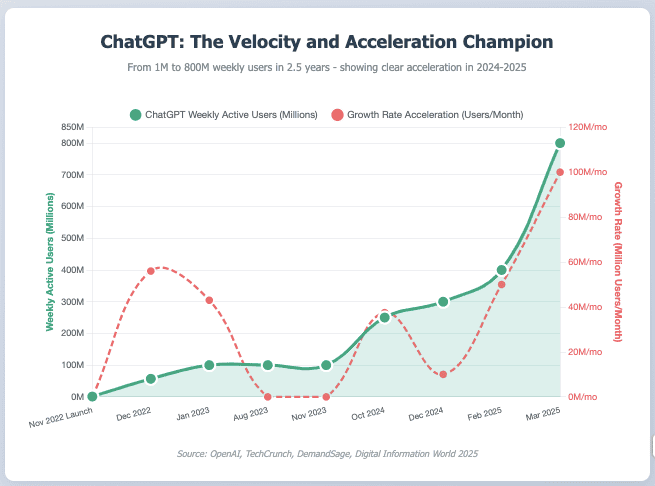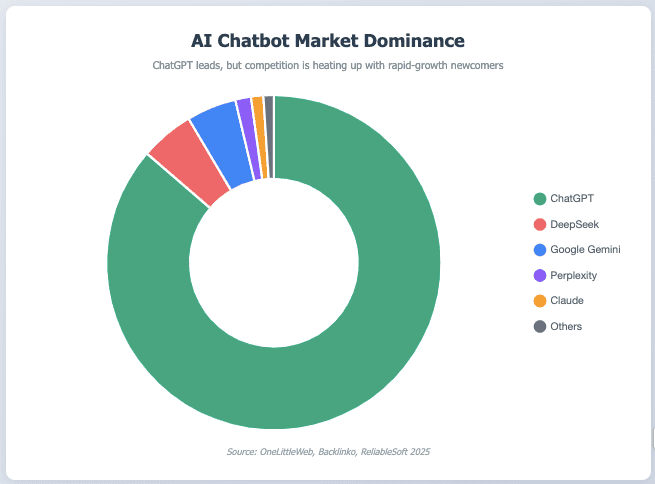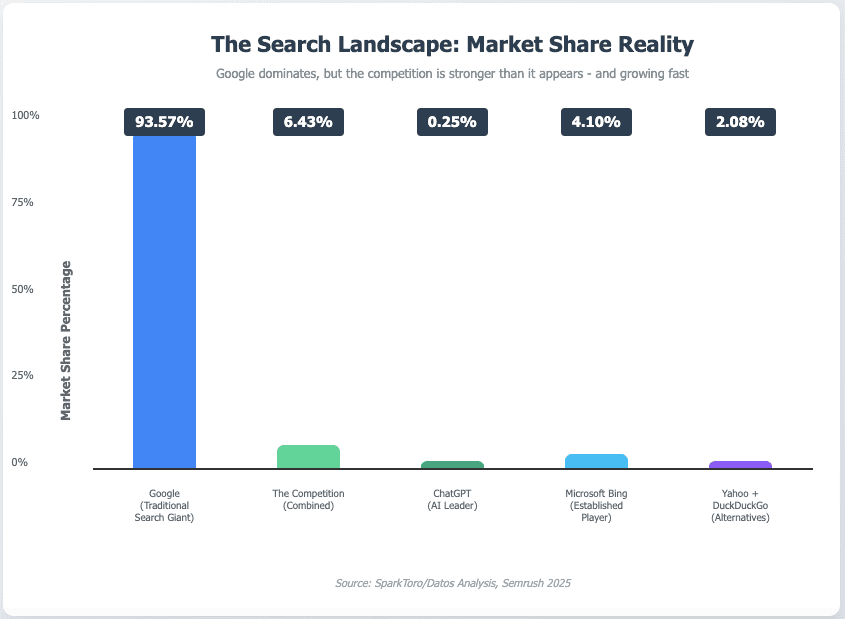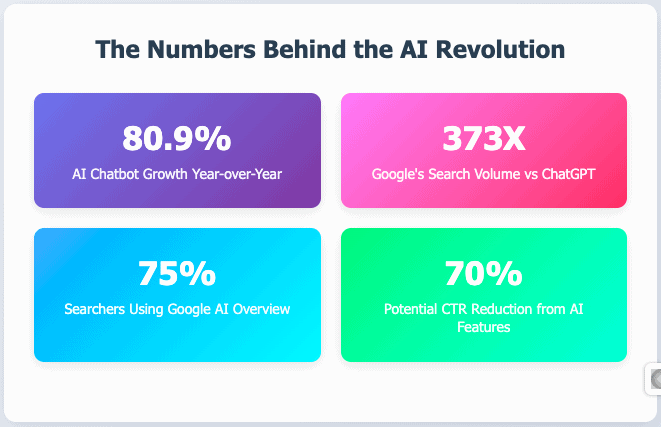Welcome to the Age of AI-Driven Discovery
Just last week, one of my dental clients shared something that made me pause mid-conversation. “Fazle,” he said, “you won’t believe what happened today. A new patient walked into my dental office and said to our receptionist, ‘Your office was recommended to me by ChatGPT.'”
As the co-founder of Experdent Web Services, I’ve been helping Canadian dentists navigate the digital landscape for years. But this moment crystallized something profound that’s been building beneath the surface of our industry – and indeed, beneath the surface of how patients discover healthcare providers entirely.
We’re witnessing the dawn of a fundamentally different era in business discovery. The age where Google’s blue links ruled supreme is giving way to something far more conversational, nuanced, and, dare I say, intelligent.
The Great Search Shake-Up
For the better part of two decades, the equation was simple: rank high on Google, get discovered. Patients would search for “dentist near me,” scroll through listings, read reviews, and make their choice. The process was predictable, if not particularly elegant.
But as Mark Twain might have observed about the river pilots of his day watching the steamboat revolution, “The old ways don’t just fade away – they get swept aside by the current of progress.”
The numbers tell a remarkable story. Google still processes an astronomical 14 billion searches per day, commanding a 93.57% market share. Meanwhile, ChatGPT handles approximately 37.5 million search-like prompts daily – giving it just 0.25% market share. Yet here’s what those numbers don’t capture: the quality and intent behind those AI interactions.

AI chatbots have exploded with 80.92% year-over-year growth, racking up 55.2 billion visits between April 2024 and March 2025, while ChatGPT dominates the chatbot world with an 86.32% market share. But more tellingly, about three in four searchers now use Google’s AI overview features, and most people talk to AI chatbots every day – a third talk to them many times per day.
The Recommendation Revolution
The difference between traditional search and AI-powered discovery isn’t just technological – it’s philosophical. When someone googles “best dentist in Toronto,” they get a list. When they ask ChatGPT, Claude, Gemini, Perplexity, or DeepSeek the same question, they get a conversation.
Here’s what that conversation might look like:
Patient: “I need a dentist in Toronto who’s good with anxious patients and offers sedation dentistry.”
AI: “Based on patient reviews and specializations, I’d recommend Dr. Sarah Chen at Toronto Smile Centre. She’s specifically trained in sedation dentistry and has consistently high ratings for patient care with anxious individuals. She offers nitrous oxide and oral sedation options. Would you like me to find her contact information or tell you more about sedation dentistry options?”
Notice what just happened? The AI didn’t just provide a name – it provided context, reasoning, and next steps. It became a personal healthcare concierge.
Another client recently told me about a patient who said, “I asked Claude about pediatric dentists who use laser technology, and it told me about your practice specifically because you have the latest WaterLase system.” The AI had synthesized information about their technology investments, patient reviews, and specialization to make a targeted recommendation.
The New Discovery Landscape: Five Platforms Reshaping Patient Acquisition
The AI ecosystem isn’t monolithic. Different platforms are emerging with distinct personalities and strengths:

1. ChatGPT – The Conversational Giant
With 3.8 billion monthly visits, ChatGPT remains the dominant force. Patients use it for complex health questions, treatment explanations, and provider recommendations.
2. Google Gemini – The Integrated Assistant
Despite 267.70 million visits monthly, Gemini’s real power lies in its integration with Google’s ecosystem, making it seamless for patients already in the Google environment.
3. Claude – The Thoughtful Analyst
Favored by patients seeking detailed, nuanced healthcare information. Claude tends to provide, in my opinion, more comprehensive, well-reasoned responses about healthcare topics.
4. Perplexity – The Cited Researcher
Popular with patients who want real-time information with sources. Perfect for those researching the latest dental technologies or treatment options.
5. DeepSeek – The Rising Disruptor
The newcomer that went from 7,475 daily visitors in August 2024 to 22.15 million by May 2025. With 277.9 million monthly visits, DeepSeek’s rapid growth suggests people are hungry for alternatives.
What This Means for Dental Practices
The implications are profound. We’re moving from a world of search engine optimization to one of answer engine optimization. Here’s how smart dental practices are adapting:
Content That Converses
Traditional SEO focused on keywords. AI optimization focuses on comprehensive, authoritative answers. Instead of writing “Best Dental Implants Toronto,” practices need content that thoroughly addresses: “What should I know about dental implants, including costs, recovery time, success rates, and how to choose the right provider?”
Reputation in the Age of AI
AI systems synthesize information from multiple sources. A practice’s reputation isn’t just about Google reviews anymore – it’s about the comprehensive digital footprint across professional directories, social media, medical forums, and patient testimonials.
Technical Excellence as Table Stakes
When an AI recommends a practice because they “use the latest WaterLase technology” or “offer same-day CEREC crowns,” it’s drawing from detailed information about technical capabilities. Practices that invest in modern technology – and communicate about it clearly – gain AI recommendation advantages.
The Data Behind the Disruption
Let me share some numbers that should make every healthcare marketer pay attention:

Current State (2025):
- Google: 14 billion daily searches (93.57% market share)
- ChatGPT: 37.5 million daily search-like prompts (0.25% market share)
- Microsoft Bing: 613 million daily searches (4.10% market share)
- Yahoo: (1.35% market share)
- DuckDuckGo: (0.73% market share)
Growth Trends:
- AI chatbots grew 80.9% year-over-year in total visits
- Gartner predicts traditional search engine volume will drop 25% by 2026
- Google search traffic rebounded in late 2024, up 21.6% year-over-year
But here’s the crucial insight: studies show AI answer boxes or overviews can slash organic click-through rates by up to 70%. Even when Google maintains search volume, the traffic to websites is fundamentally changing.

The Patient Journey Transformation
The patient journey used to be linear: awareness → research → selection → contact. AI has made it cyclical and conversational:
Traditional Journey:
- Feel tooth pain
- Google “dentist near me”
- Read reviews
- Call office
AI-Enhanced Journey:
- Feel tooth pain
- Ask AI: “What could be causing this sharp pain in my back molar?”
- Learn about possible conditions
- Ask: “What type of dentist should I see for this?”
- Ask: “Who are the best endodontists in my area?”
- Get specific recommendations with reasoning
- Ask for contact information
- Sometimes: Ask AI to help draft questions for the consultation
This isn’t just more steps – it’s deeper engagement. Patients arrive more educated, with better questions, and clearer expectations.
Strategic Responses: The Experdent Approach
At Experdent, we’re evolving our strategies to match this new reality. Here’s our framework for the AI age:
1. Answer-First Content Strategy
Instead of keyword-focused blog posts, we create comprehensive guides that directly answer the questions patients are asking AI systems. Our “Complete Guide to Dental Implants in Canada” doesn’t just target keywords – it provides the thorough, authoritative answer that AI systems love to reference.
2. Technical Authority Documentation
We ensure every piece of equipment, every certification, every specialization is clearly documented online. When an AI system is looking for a “dentist with CBCT imaging capabilities,” the information needs to be easily discoverable and contextual.
3. Multi-Platform Reputation Management
We monitor and help optimize our clients’ presence not just on Google, but across all platforms that AI systems might reference: Healthgrades, RateMDs, professional association directories, our own new directory experdent.com and even social media discussions.
4. Structured Data Excellence
Technical implementation matters more than ever. Proper schema markup, clear categorization, and structured information help AI systems understand and recommend practices accurately.
5. Conversational Content Formats
We’re creating content that mirrors how people actually talk to AI: FAQ formats, conversational guides, and step-by-step explanations rather than formal, clinical descriptions.
Looking Ahead: 3 Predictions for 2026
Looking Ahead:
Based on current trends and our work with dental practices, here are my predictions:
1. The 25% Shift Will Hit Healthcare First Gartner’s prediction of a 25% drop in traditional search volume by 2026 will be most pronounced in healthcare, where patients increasingly want personalized, conversational guidance rather than generic search results.
2. AI Recommendation Systems Will Require New Ethics As AI systems become primary referral sources, we’ll see new frameworks for ensuring fair representation and preventing algorithmic bias in healthcare recommendations.
3. The Rise of “AI-Native” Practices Just as some businesses were “mobile-first” or “social-first,” we’ll see practices built from the ground up to excel in AI recommendation systems – with content strategies, technical infrastructure, and patient communication designed for the AI age.
The Bottom Line: Adaptation or Obsolescence
Mark Twain wrote about riverboat pilots who had to learn entirely new navigation systems when the river changed course. The pilots who adapted thrived. Those who clung to old methods found themselves stranded.
The same choice faces dental practices today. The question isn’t whether AI will change patient discovery – it’s whether your practice will be ready when it does.
That patient who walked into my client’s office saying “Your office was recommended to me by ChatGPT” represents the future. And the future, as it turns out, is already here.
Talk to us. We have helped many practices like yours navigate SEO and AEO. See if we can help your dental practice find visibility and salience in this new world.
Fazle Ali Naqvi is co-founder and VP of Experdent Web Services Inc., providing digital marketing services exclusively to dental practices across Canada. When he’s not helping dentists navigate the digital landscape, he’s probably asking ChatGPT about the best way to optimize for answer engines. Connect with Fazle on LinkedIn to discuss how AI is reshaping healthcare marketing.
1. All charts are created with the help of Calude AI.
2. Sources: Data compiled from SparkToro/Datos, Semrush, Gartner, OneLittleWeb, and various industry reports on AI adoption and search behavior trends, 2024-2025.

